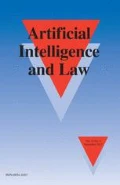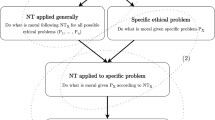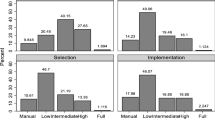Abstract
The main stream of legal theory tends to incorporate unwritten principles into the law. Weighing of principles plays a great role in legal argumentation, inter alia in statutory interpretation. A weighing and balancing of principles and other prima facie reasons is a jump. The inference is not conclusive.
To deal with defeasibility and weighing, a jurist needs both the belief-revision logic and the nonmonotonic logic. The systems of nonmonotonic logic included in the present volume provide logical tools enabling one to speak precisely about various kinds of “rules about rules”, dealing with such things as applicability of rules, what is assumed by rules, priority between rules and the burden of proof. Nonmonotonic logic is an example of an extension of the domain of logic. But the more far-reaching the extension is, the greater problems it meets. It seems impossible to make logical reconstruction of the totality of legal argumentation.
The lawyers' search for reasons has no obvious end point. Ideally, the search for reasons may end when one arrives at a coherent totality of knowledge. In other words, coherence is the termination condition of reasoning. Both scientific knowledge and knowledge of legal and moral norms progresses by trial and error, and that one must resort to a certain convention to define what “error” means. The main difference is, however, that conventions of science are much more precise than those of legal scholarship.
Consequently, determination of “error” in legal science is often holistic and circular. The reasons determining that a legal theory is “erroneous” are not more certain than the contested theory itself. A strict and formal logical analysis cannot give us the full grasp of legal rationality. A weaker logical theory, allowing for nonmonotonic steps, comes closer, at the expense of an inevitable loss of computational efficiency. Coherentist epistemology grasps even more of this rationality, at the expense of a loss of preciseness.
Similar content being viewed by others
References
Aarnio, Aulis. 1984. Paradigms in Legal Dogmatics. In: A. Peczenik, L. Lindahl and B. van Roermund (edd.), Theory ofLegal Science. Dordrecht/Boston/Lancaster: Reidel.
Alchourrón, Carlos and Bulygin, Eugenio. 1971. Normative Systems. Wien New York: Springer-Verlag.
Alchourrón, Carlos and Makinson, David. 1982. On the Logic of Theory Change: Contraction functions and their associated revision functions. Theoria Vol. XLVIII Part 1.
Alchourrón, Carlos; Gärdenfors, Peter and Makinson, David. 1985. On the Logic of Theory Change: Partial Meet Functions for Contractions and Revisions. Journal of Symbolic Logic 50: 510–530.
Alexy, Robert. 1985. Theorie der Grundrechte. Baden-Baden: Nomos (Frankfurt/M. 1986: Suhrkamp).
Alexy, Robert. 1985b. Rechtsregeln and Rechtsprinzipien. ARSP Beiheft 25.
Alexy, Robert. 1992. Begriff und Geltung des Rechts. Freiburg/München: Verlag Karl Alber. Alexy, Robert. 1993. Justification and Application of Norms. Ratio Juris Vol. 6 No. 2.
Alexy, Robert and Peczenik, Aleksander. 1990. The Concept of Coherence and its Significance for Discursive Rationality. Ratio Juris Vol. 3 No. 1bis.
Åqvist, Lennart. 1992. Prima facie Obligations in Deontic Logic: A Chisholmian Analysis Based on Normative Preference Structures. In press in: Proceedings of the Saarbriicken Colloquium PREFERENCES. Saarlouis. June 1992.
Bender, John W. (ed.). 1989. The Current State of the Coherence Theory. Critical Essays on the Epistemic Theories of Keith Lehrer and Laurence BonJour, with Replies. Dordrecht Boston/London: Kluwer Academic Publishers.
Bergholtz, Gunnar. 1992. Atal och kontradiktion. Marginalanteckningar till några yngre rättsfall. In: Festskrift till Per Olof Bolding. Stockholm: Juristförlaget.
BonJour, Laurence. 1985. The Structure of Empirical Knowledge. Cambridge, Mass.: Harvard University Press.
Castañeda, Hector-Neri. 1989. The Multiple Faces of Knowing: The Hierarchies of Epistemic Species. In: Bender 1989.
Chisholm, R. M. 1966. Theory of Knowledge. Englewood Cliffs: Prentice-Hall.
Chisholm, R. M. 1974. Practical Reason and the Logic of Requirement. In: J. Raz (ed.). Practical Reasoning. Oxford 1978: Oxford University Press.
Dancy, Jonathan. 1985. An Introduction to Contemporary Epistemology. Oxford & Cambridge, Mass.: Blackwell.
Frändberg, Åke. 1973. Om analog användning av rättsnormer. With a Summary in English: On Analogical Use of Legal Norms. Stockholm: Norstedts.
Gärdenfors, Peter. 1990. The Dynamics of Belief Systems: Foundations vs. Coherence Theories. Revue Internationale de Philosophie 172 (1): 24–46.
Goldman, Alvin. 1989. BonJour's Structure of Empirical Knowledge. In: Bender 1989.
Goodman, Nelson. 1955. Fact, Fiction and Forecast. Cambridge, Mass.: Harvard University Press.
Hage, Jaap C. 1997. Reasoning with Rules. An Essay on Legal Reasoning and Its Underlying Logic. Dordrecht: Kluwer Academic Publishers.
Kaufmann, Arthur. 1982. Analogie and “Natur der Sache”; Zugleich ein Beitrag zur Lehre vom Typus. 2nd ed. Heidelberg: Decker and Müller. English translation of the first edition by Ilmar Tammelo: “Analogy and the Nature of Things; A Contribution to the Theory of Types”. Journal of the Indian Law Institute 8 (1966), 358–401.
Koertge, Noretta. 1978: Towards a New Theory of Scientific Inquiry. In: G. Radnitzky and G. Andersson (edd.), Progress and Rationality in Science. Dordrecht - London: Reidel.
Krygier, Martin. 1991. Thinking Like a Lawyer. In: Wojciech Sadurski (ed.), Ethical Dimensions of Legal Theory. Amsterdam - Atlanta, Ga: Rodopi.
Kuhn, Thomas S. 1970. The Structure of Scientific Revolutions. 2nd ed. Chicago: Chicago University Press.
Lehrer, Keith. 1989. Coherence and the Truth Connection: A reply to my critics. In: Bender 1989.
Luhmann, Niklas. 1993. Das Recht der Gesellschaft. Frankfurt/M.: Suhrkamp.
Nerhot, Patrick (ed.). 1991. Legal Knowledge and Analogy. Fragments of Legal Epistemology, Hermeneutics and Linguistics. Dordrecht/Boston/London: Kluwer Academic Publishers.
Opalek, Kazimierz and Wolenski, Jan. 1975. Das Problem der Axiomatisierung des Rechts. In: Forschungen aus Staat and Recht, Band 32: Rechtstheorie und Rechtsinformatik. Wien: Springer-Verlag.
Pattaro, Enrico. 1988. Models of Reason, Types of Principles and Reasoning. Ratio luris. Vol. 1 No. 2.
Peczenik, Aleksander. 1989. On Law and Reason. Dordrecht/Boston/London: Kluwer Academic Publishers.
Peczenik, Aleksander. 1995. Vad är rätt? Stockholm: Norstedts juridik.
Peczenik, Aleksander. 1971. “Analogia legis. Analogy from Statutes in Continental Law”. In Le Raisonnement Juridique. Proceedings of the World Congress for Legal and Social Philosophy. Ed. Hubert Hubien. Brussels: Établissements Émile Bruylant: 329–336.
Polanyi, Michael. 1962. Personal Knowledge. Towards a Post-Critical Philosophy. Corrected Edition. Chicago: University Press.
Pollock, John L. 1986. Contemporary Theories of Knowledge. Totowa, NJ: Rowman and Littlefield.
Popper, Karl R. 1959. The Logic of Scientific Discovery. New York: Basic Books.
Popper, Karl R. 1972. Objective Knowledge. Oxford: Clarendon Press.
Prakken, Henry and Sartor, Giovanni. 1995. Argumentation Frameworks: The Missing Link Between Arguments and Procedure. Preliminary Proceedings of the 17th IVR World Congress, Bologna, CLUEB, Vol. 5.
Quine. Willard Van Orman. 1953. From a Logical Point of View. Cambridge, Mass.: Harvard University Press.
Rabinowicz, Wlodek and Österberg, Jan. 1996. Value Based on Preferences. On Two Interpretations of Preference Utilitarianism. In: Preference and Value. Preferentialism in Ethics. Lund: Studies in Philosophy, Department of Philosophy, Lund University.
Rawls, John. 1971. A Theory of Justice. Oxford: University Press.
Rolf, Bertil. 1991. Profession, tradition och tyst kunskap. En studie i Michael Polyanyis teori om den professionella kunskapens tysta dimension. Lund: Nya Doxa.
Ross, W. D. 1930. The Right and the Good. Oxford: Clarendon Press.
Strömberg, Tore. 1988. Rättsordningens byggstenar. Om normtyperna i lag och sedvanerätt. Lund: Studentlitteratur.
Sundberg, Jacob. W.F. 1978. Fr. Eddan t. Ekelöf. Repetitorium om rättskällor i Norden. Malmö: Studentlitteratur.
Tersman. Folke. 1993. Reflective Equilibrium. In Essay in Moral Epistemology. Stockholm: Almqvist & Wiksell International.
von Wright, G. H. 1957. Logical Studies. London: Routledge & Kegan Paul.
Zahle, Henrik. 1986. Polycentri i retskildelaere. Festskrift til Torstein Eckhoff. Oslo: Tano.
Zahle, Henrik. 1992. Findes det kun en bevisret? Festskrift till Per Olof Bolding. Stockholm: Juristförlaget.
Author information
Authors and Affiliations
Rights and permissions
About this article
Cite this article
Peczenik, A. Jumps and logic in the law. Artif Intell Law 4, 297–329 (1996). https://doi.org/10.1007/BF00118495
Issue Date:
DOI: https://doi.org/10.1007/BF00118495




